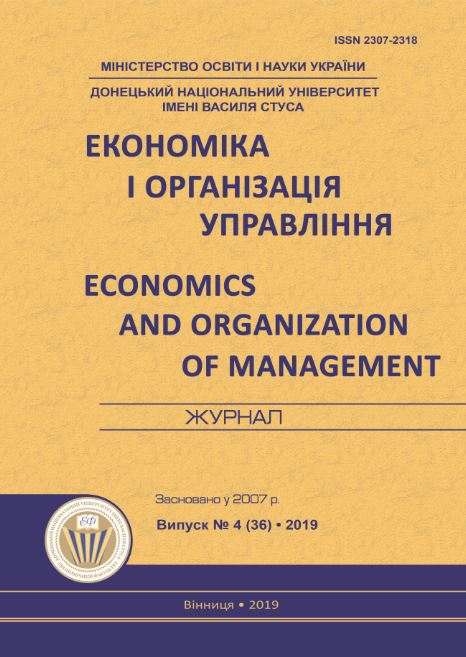Environmental management in the context of contemporary global energy and environmental trends.
DOI:
https://doi.org/10.31558/2307-2318.2019.4.15Keywords:
primary energy consumption, energy intensity of the economy, energy efficiency of the economy, carbon dioxide emissions, carbon dioxide emissions intensity, global energy trends, global environmental trends, greening managementAbstract
The article is devoted to the analysis of global energy and environmental trends as factors of strengthening the trends in greening management. According to the results of the analysis, it was found that the intensive development of the world economy in the second half of the 20th century led to a rapid increase in demand for energy resources. Significant intensification of primary energy consumption has been observed since the beginning of the 2000s, which was largely ensured by increased demand in the countries of the Asia-Pacific region. Primary energy consumption growth is noted for all types of energy resources. In the period 1990-2018, a reduction in the energy intensity of the global economy has been observed, although some of its slowdown has recently been noted. The increase in energy consumption has led to a corresponding increase in carbon dioxide emissions and, as a result, a number of environmental problems. Since the early 2000s, carbon dioxide emissions have been increasing rapidly in the countries of the Asia-Pacific region. The intensity of carbon dioxide emissions in the world over the past decades has been gradually decreasing. Despite certain positive changes, the Ukrainian economy is characterized by the world's lowest energy efficiency and the highest emission intensity, which requires the implementation of more effective environmental policy measures.References
Власенко В. О. Екологічна економіка як інструмент упровадження сталого розвитку: поняття та принципи правового регулювання. Зовнішня торгівля: економіка, фінанси, право. 2013. № 5-6. С. 22-28. URL: http://nbuv.gov.ua/UJRN/-uazt_2013_5-6_6.
Герасимчук З.В. Еколого-економічні основи формування та реалізації регіональної політики сталого розвитку (питання методології та методики): Автореф. дис. ... доктора екон. наук: 08.10.01 / Ін-т регіональних досліджень. НАНУ. Львів, 2002. 47 с.
Гринів Л.С. Екологічно збалансована економіка: проблеми теорії: монографія. Львів: ЛНУ ім. І. Франка, 2001. 240 с
Грищенко В.Ф. Экологизация международных отношений в условиях глобализации. Вісник Сумського державного університету. Серія. Економіка. 2005. №2(74). С. 36-42.
Данилишин Б.М. Эколого-экономические проблемы обеспечения устойчивого развития производительных сил Украины (на примере АПК Украины): Дис. ... доктора екон. наук: 08.10.01 / НАН Украины; Совет по изучению производительных сил Украины, 1997. 398 с.
Дергачова В.В. Енергоекономічні чинники сталого розвитку: аналіз та оцінка впливу: Автореф. дис. ... канд. екон. наук: 08.02.03 /Інститут економічного прогнозування. НАНУ. К., 2001. 19 с.
Дорогунцов С.И., Ральчук А.И. Управление техногенно-экологической безопасностью в контексте парадигмы устойчивого развития: концепция системнодинамического решения. – К.: Наукова думка, 2002. – 201 с.
Жихарєва А.Б. Розвиток екологізації державного управління в Україні: монографія. К.: АМУ, 2017. 196 с.
Корпан Р.В. Екологізація управління та економічне зростання: моделювання та аналіз взаємозв’язку: Автореф. дис. ... канд. екон. наук: 08.08.01 / Сумський державний університет. Суми, 2005. 24 с.
Кульчицький Я.В. Сучасні економічні системи в умовах екологізації та глобалізації (теоретико-методологічні засади порівняння): монографія. Львів: Ліга-Прес, 2011. 687 с.
Туниця Т.Ю. Міжнародні аспекти проблем екологізації економіки. Науковий вісник НЛТУ України. 2005. Вип. 15.6. С. 238-242.
Цибуляк А. Екологізація економіки України в умовах розширення співпраці з ЄС. Причорноморські економічні студії. 2016. Вип. 8. С. 31-35.
Gowdy J., O’Hara S. Economic theory for environmentalists. St. Lucie, Florida, 1996.
Common M. Environmental and Resource Economics: an Introduction. Edinburg (England), 1996.
Gandhi Ved P. (ed.). Macroeconomics and the Environment. Washington, 1996.
Keijzers G. The evolution of Dutch environmental policy: the changing ecological arena from 1970-2000 and beyond. Journal of Cleaner Production. 2000 (8). P. 179-2000.
Kohlstad C. D. Environmental Economics. New York, London, 2000.
Krarup S., Ramesohl S. Voluntary agreements on energy efficiency in industry – not a golden key, but another contribution to improve climate policy mix. Journal of Cleaner Production. 2002 (10). P. 109-120.
Hanks J. Voluntary agreements, climate change and industrial energy efficiency. Journal of Cleaner Production. 2002. №10. P. 103-107.
Hanley N., Shogren J., White B. Environmental economics in theory and practice. London, 1997.
The Prize in Economic Sciences 2018 URL: https://old.nobelprize.org/ecopress.pdf?_ga=2.151663408.843139967. 1538992785-977446196.1538476224 – Title of the screen.
William D. Nordhaus, Zili Yang. A Regional Dynamic General-Equilibrium Model of Alternative Climate-Change Strategies. American Economic Review. Vol. 86, No. 4, September 1996, pp. 741-765. URL: http://www.econ.yale.edu/~nordhaus/homepage/homepage/cowles%20foundation%20paper% 20%23%20930.pdf
BP Statistical Review of World Energy June 2019. URL: https://www.bp.com/en/global/corporate/energy-economics/statistical-review-of-worldenergy.html
Energy intensity (koe/$2015p). Global Energy Statistical Yearbook 2019. URL: https://yearbook.enerdata.net/total-energy/world-energy-intensity-gdp-data.html – Title of the screen.
CO2 emissions from fuel combustion (MtCO2). Global Energy Statistical Yearbook 2019. URL: https://yearbook.enerdata.net/co2-fuel-combustion/world-CO2-intensity.html – Title of the screen.
CO2 intensity (kCO2/$2015p). Global Energy Statistical Yearbook 2019. URL: https://yearbook.enerdata.net/co2-fuel-combustion/world-CO2-intensity.html – Title of the screen.

